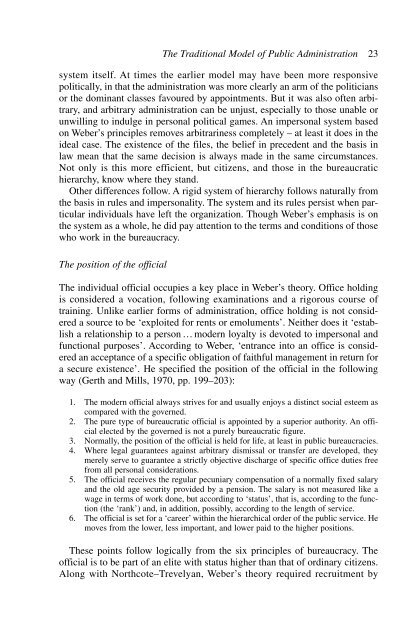Public Management and Administration - Owen E.hughes
Public Management and Administration - Owen E.hughes
Public Management and Administration - Owen E.hughes
You also want an ePaper? Increase the reach of your titles
YUMPU automatically turns print PDFs into web optimized ePapers that Google loves.
system itself. At times the earlier model may have been more responsive<br />
politically, in that the administration was more clearly an arm of the politicians<br />
or the dominant classes favoured by appointments. But it was also often arbitrary,<br />
<strong>and</strong> arbitrary administration can be unjust, especially to those unable or<br />
unwilling to indulge in personal political games. An impersonal system based<br />
on Weber’s principles removes arbitrariness completely – at least it does in the<br />
ideal case. The existence of the files, the belief in precedent <strong>and</strong> the basis in<br />
law mean that the same decision is always made in the same circumstances.<br />
Not only is this more efficient, but citizens, <strong>and</strong> those in the bureaucratic<br />
hierarchy, know where they st<strong>and</strong>.<br />
Other differences follow. A rigid system of hierarchy follows naturally from<br />
the basis in rules <strong>and</strong> impersonality. The system <strong>and</strong> its rules persist when particular<br />
individuals have left the organization. Though Weber’s emphasis is on<br />
the system as a whole, he did pay attention to the terms <strong>and</strong> conditions of those<br />
who work in the bureaucracy.<br />
The position of the official<br />
The Traditional Model of <strong>Public</strong> <strong>Administration</strong> 23<br />
The individual official occupies a key place in Weber’s theory. Office holding<br />
is considered a vocation, following examinations <strong>and</strong> a rigorous course of<br />
training. Unlike earlier forms of administration, office holding is not considered<br />
a source to be ‘exploited for rents or emoluments’. Neither does it ‘establish<br />
a relationship to a person … modern loyalty is devoted to impersonal <strong>and</strong><br />
functional purposes’. According to Weber, ‘entrance into an office is considered<br />
an acceptance of a specific obligation of faithful management in return for<br />
a secure existence’. He specified the position of the official in the following<br />
way (Gerth <strong>and</strong> Mills, 1970, pp. 199–203):<br />
1. The modern official always strives for <strong>and</strong> usually enjoys a distinct social esteem as<br />
compared with the governed.<br />
2. The pure type of bureaucratic official is appointed by a superior authority. An official<br />
elected by the governed is not a purely bureaucratic figure.<br />
3. Normally, the position of the official is held for life, at least in public bureaucracies.<br />
4. Where legal guarantees against arbitrary dismissal or transfer are developed, they<br />
merely serve to guarantee a strictly objective discharge of specific office duties free<br />
from all personal considerations.<br />
5. The official receives the regular pecuniary compensation of a normally fixed salary<br />
<strong>and</strong> the old age security provided by a pension. The salary is not measured like a<br />
wage in terms of work done, but according to ‘status’, that is, according to the function<br />
(the ‘rank’) <strong>and</strong>, in addition, possibly, according to the length of service.<br />
6. The official is set for a ‘career’ within the hierarchical order of the public service. He<br />
moves from the lower, less important, <strong>and</strong> lower paid to the higher positions.<br />
These points follow logically from the six principles of bureaucracy. The<br />
official is to be part of an elite with status higher than that of ordinary citizens.<br />
Along with Northcote–Trevelyan, Weber’s theory required recruitment by











